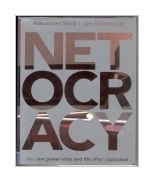|
||
• wydawnictwa polskie
• Zamów informacje o nowościach z wybranego tematu • kontakt
• Cookies na stronie |
NETOCRACY THE NEW POWER ELITE AND LIFE AFTER CAPITALISMBARD A.wydawnictwo: REUTERS , rok wydania 2002, wydanie Icena netto: This book was born out of the deepest frustration. We could no longer bear the ignorance and childishness of the public debate about the digital future. What was being said and written was to such a depressingly large extent tainted by ideological wishful thinking and/or completely without any foundation in an historical analysis of how a breakthrough of information technology could transform a society. Neither the intoxicated optimists nor the gloomy pessimists have been able to engage seriously in the problematics; they are both right only in the most banal respects, and wrong about everything important. And yet we live and work in Sweden, a country that is constantly held up as an example of the early adoption of new technology and a high degree of globalization. If we are constantly forced to wade through all this nonsense, whatever must it be like in the rest of the world? As we wrote in the Introduction to the original edition of this book, it is about time that someone got a firm grip on the most difficult and important issues arising when a new form of information technology is breaking through on all fronts: What will happen to the state? What will happen to politics and democracy? What will happen to education and the labour market? What will happen to the creation of identity and patterns of consumption? How will the media, art and philosophy be affected? How will the old class structures be altered, and what will the new class struggles look like? Which groups will be favoured and which harmed by the new circumstances? How will the new electronic networks function? How will power and status be distributed within the new hierarchies that are emerging? What are the interests and strategies of the new elite? What are the characteristics of the new underclass? Which sciences will set the tone? Which social problems will be most acute, and what solutions are available? How will man's image of himself and the world change, and what consequences will this have? And so on. Table of Contents INTRODUCTION 1 TECHNOLOGY AS THE DRIVING FORCE OF HISTORY 2 FEUDALISM, CAPITALISM AND INFORMATIONALISM 3 PLURARCHAL SOCIETY THE DEATH OF ETATISM AND THE CRISIS OF DEMOCRACY 4 INFORMATION, PROPAGANDA AND ENTERTAINMENT 5 CURATORS, NEXIALISTS AND ETERNALISTS THE NETOCRATS AND THEIR WORLD VIEW 6 GLOBALIZATION, THE DEATH OF MASS MEDIA AND THE GROWTH OF THE CONSUMTARIAT 7 THE NEW BIOLOGY AND NETOCRATIC ETHICS 8 THE CONVULSIONS OF COLLECTIVITY THE DEATH OF MAN AND THE VIRTUAL SUBJECT 9 NETWORK PYRAMIDS ATTENTIONALISTIC POWER HIERARCHIES 11 BEHIND THE FIREWALLS NETOCRATIC CIVIL WAR AND VIRTUAL REVOLUTIONARIES INDEX Paperback 268 pages Księgarnia nie działa. Nie odpowiadamy na pytania i nie realizujemy zamówien. Do odwolania !. |


